
ピーク検出
取得したデータからピークを見つけることは、データのタイプによって異なる一種の芸術です。
ピーク検出を容易にするため、ベースライン(または「トレンド」)を除去することや、データを平滑化することが有効です。
正方向のみ、または負方向のみのピークが連続する場合:
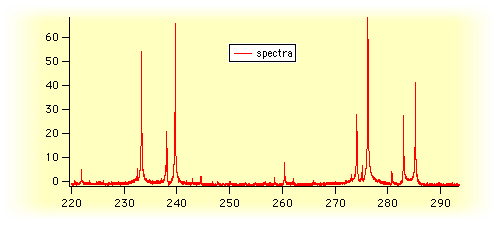
ピーク位置を自動的に特定するには、PeakAreasUnipolar.ipf プロシージャファイル(テクニカルノート #020-C Unipolar Peak Areas)を使用できます:
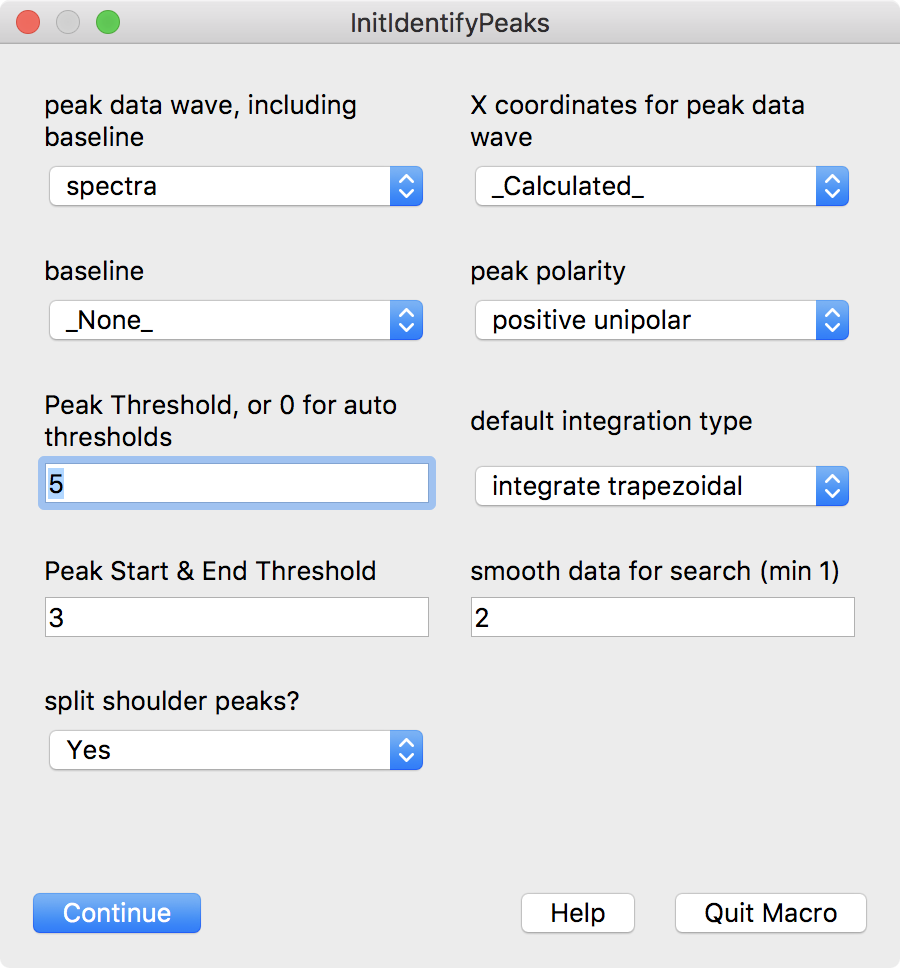
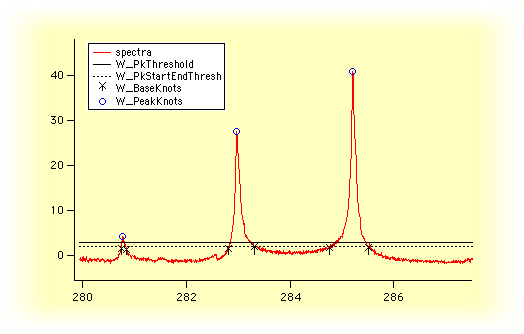
正負の値が交互に現れるピークに対して:
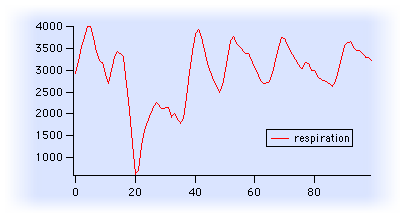
ピーク面積を自動検出、ベースライン構築、面積計算するには、Peak Areas.ipf プロシージャファイル(テクニカルノート #020-B Peak Areas の一部)を使用できます:
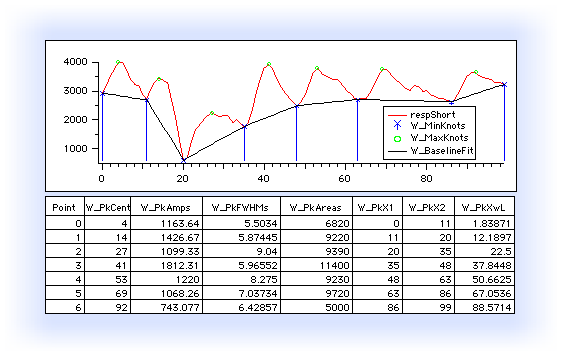
プログラミングに慣れているなら、Igor Pro の組み込み FindPeak コマンドをプロシージャ内で繰り返し使って、ピークの開始点と終了点を特定できます:
Wave w // peak data Make/O/N=(maxPeaks) peakPositionsX= NaN, peakPositionsY= NaN Variable peaksFound=0 Variable startP=0 Variable endP= DimSize(w,0)-1 do FindPeak/B=(smoothing)/I/M=(threshold)/P/Q/R=[startP,endP] w // FindPeak outputs are V_Flag, V_PeakLoc, V_LeadingEdgeLoc, // V_TrailingEdgeLoc, V_PeakVal, and V_PeakWidth. if( V_Flag != 0 ) break endif peakPositionsX[peaksFound]=pnt2x(w,V_PeakLoc) peakPositionsY[peaksFound]=V_PeakVal peaksFound += 1 startP= V_TrailingEdgeLoc+1 while( peaksFound < maxPeaks ) if( peaksFound ) Redimension/N=(peaksFound) peakPositionsX, peakPositionsY DoWindow/F ShowPeaks if(V_Flag == 0 ) Display/N=ShowPeaks w AppendToGraph/W=ShowPeaks peakPositionsY vs peakPositionsX ModifyGraph/W=ShowPeaks mode(peakPositionsY)=3,marker(peakPositionsY)=19, rgb(peakPositionsY)=(0,0,65535) endif else DoAlert 0, "No peaks found using threshold= "+num2str(threshold) KillWaves/Z peakPositionsX, peakPositionsY endif
Multi-Peak Fitting パッケージは、Peak AutoFind.ipf プロシージャを使います。このプロシージャは FindLevel コマンドを用いて、データの平滑化された導関数を検索します。このプロシージャを使うには、次のように入力します:
#include <Peak AutoFind>
Procedure ウィンドウで、または Analysis→Packages サブメニューから Multi-peak Fitting 2 を選択します。ルーチンを表示するには、Igor Pro の Window→Procedure Windows メニューから Peak AutoFind.ipf プロシージャを選択し、ルーチンの使用方法の表示には Procedure Windows メニューから Multi-Peak Fitting 2.ipf を選択します。
以下は、Peak AutoFind プロシージャファイルを使う手順です:
#pragma rtglobals=1 #include <Peak AutoFind> Menu "Analysis" "Automatically Find Peaks", /Q, MyAutomaticallyFindPeaks() EndMacro Function MyAutomaticallyFindPeaks() String wname, xdata="_calculated_" Variable maxPeaks=100, minPeakPercent=5 Prompt wname, "Peak Wave", popup, WaveList("*",";","DIMS:1,TEXT:0,CMPLX:0")+"_none_;" Prompt xdata, "X values", popup, "_calculated_;"+WaveList("*",";","DIMS:1,TEXT:0,CMPLX:0") Prompt maxPeaks, "Maximum Peaks" Prompt minPeakPercent, "Minimum Peak Amplitude (% max)" DoPrompt "Automatically Find Peaks", wname, xdata, maxPeaks, minPeakPercent if( V_Flag != 0 ) return 0 // user cancelled endif WAVE/Z w=$wname WAVE/Z wx=$xdata Variable pBegin=0, pEnd= numpnts(w)-1 Variable/C estimates= EstPeakNoiseAndSmfact(w,pBegin, pEnd) Variable noiselevel=real(estimates) Variable smoothingFactor=imag(estimates) Variable peaksFound= AutoFindPeaks(w,pBegin,pEnd,noiseLevel,smoothingFactor,maxPeaks) if( peaksFound > 0 ) WAVE W_AutoPeakInfo // Remove too-small peaks peaksFound= TrimAmpAutoPeakInfo(W_AutoPeakInfo,minPeakPercent/100) if( peaksFound > 0 ) // Make waves to display in a graph // The x values in W_AutoPeakInfo are still actually points, not X Make/O/N=(peaksFound) WA_PeakCentersY = w[W_AutoPeakInfo[p][0]] AdjustAutoPeakInfoForX(W_AutoPeakInfo,w,wx) Make/O/N=(peaksFound) WA_PeakCentersX = W_AutoPeakInfo[p][0] // Show W_AutoPeakInfo in a table, with dimension labels SetDimLabel 1, 0, center, W_AutoPeakInfo SetDimLabel 1, 1, width, W_AutoPeakInfo SetDimLabel 1, 2, height, W_AutoPeakInfo CheckDisplayed/A W_AutoPeakInfo if( V_Flag == 0 ) Edit W_AutoPeakInfo.ld endif DoWindow ShowPeaks if( V_Flag == 0 ) if( WaveExists(wx) ) Display/N=ShowPeaks w vs wx else Display/N=ShowPeaks w endif AppendToGraph/W=ShowPeaks WA_PeakCentersY vs WA_PeakCentersX ModifyGraph/W=ShowPeaks rgb(WA_PeakCentersY)=(0,0,65535) ModifyGraph/W=ShowPeaks mode(WA_PeakCentersY)=3 ModifyGraph/W=ShowPeaks marker(WA_PeakCentersY)=19 endif endif endif if( peaksFound < 1 ) DoAlert 0, "No Peaks found!" endif return peaksFound End
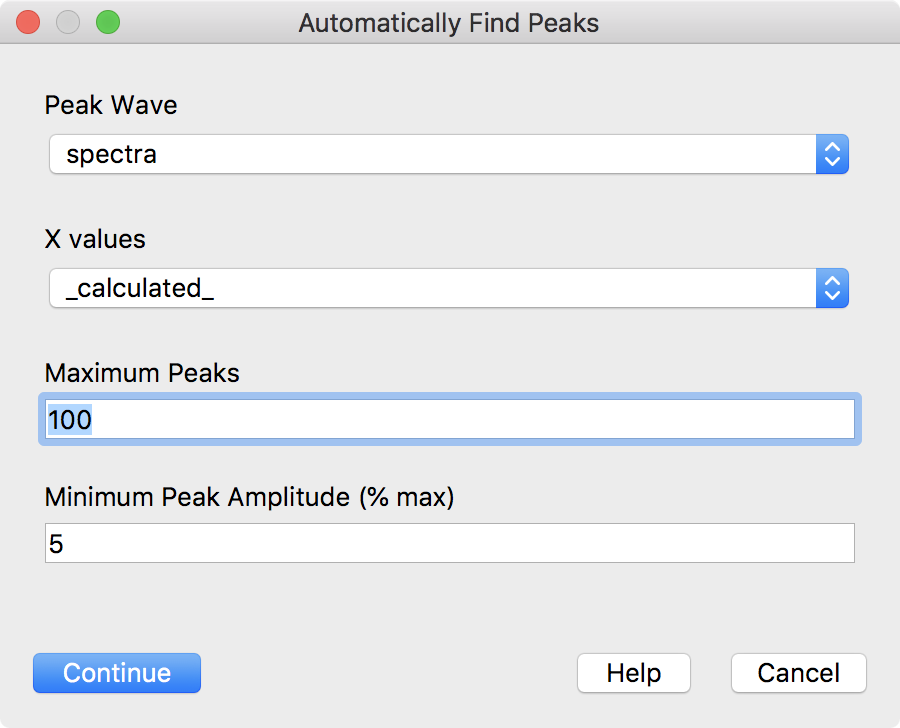
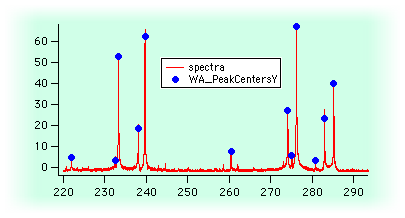
(このコードの近代化版が、Igor Pro® 8 の#include <Peak AutoFind> プロシージャファイルに追加されました。)
参照: レベル検出

Forum

Support

Gallery
Igor Pro 10
Learn More
Igor XOP Toolkit
Learn More
Igor NIDAQ Tools MX
Learn More